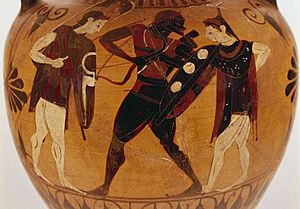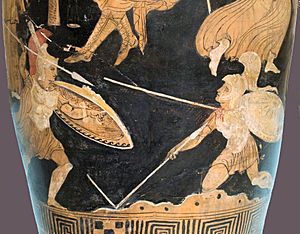Memnon facts for kids
In Greek mythology, Memnon was a powerful king from Aethiopia. He was the son of Tithonus and Eos, the goddess of dawn. Memnon was a skilled warrior, almost as good as the famous Greek hero Achilles.
During the Trojan War, Memnon led a large army to help defend the city of Troy. In a fierce battle, he killed Antilochus, who was the son of the wise Greek elder, Nestor. Nestor then challenged Memnon to a fight. However, Memnon refused, saying it would not be honorable to fight such an old man.
Nestor then begged Achilles to get revenge for his son's death. Even though there were warnings that Achilles would soon die after Memnon, the two great warriors fought. Memnon wounded Achilles, but Achilles ultimately killed Memnon with his spear. Memnon's death caused his Aethiopian army to run away.
After Memnon died, Zeus, the king of the gods, felt sad for Eos. He saw her tears and decided to make Memnon immortal. Memnon's story is told in ancient Greek poems, especially in a lost epic called Aethiopis.
Contents
Memnon's Story in Mythology
Memnon Arrives at Troy
Memnon arrived at Troy with his huge army from Aethiopia. His army was so big it seemed impossible to count. Everyone in Troy was excited, especially King Priam, who hoped Memnon would save their city.
Memnon was very humble. He told Priam that his true strength would be shown in battle, not by boasting at dinner. This showed he was a respectful and honorable warrior.
The Battle and Memnon's Death
Before the next day's battle, Zeus made all the other gods promise not to interfere. This meant the fight would be fair between the heroes. In the battle, Memnon killed Antilochos, the son of the Greek hero Nestor. Antilochos had just killed Memnon's friend, Aesop.
Nestor, despite being old, tried to fight Memnon to avenge his son. But Memnon refused to fight him. He respected Nestor's age and thought it would be wrong to harm him. This act showed Memnon had strong values, much like Achilles.
When Memnon reached the Greek ships, Nestor begged Achilles to fight him. Achilles and Memnon then clashed in a mighty duel. Both wore special armor made by the god Hephaestus. Zeus made both warriors tireless and huge so everyone could watch their epic fight. Finally, Achilles stabbed Memnon through the heart. Memnon's army fled in fear.
The Memnonides Birds
To honor Memnon, the gods collected all the drops of blood that fell from him. They used the blood to form a huge river. On every anniversary of Memnon's death, this river is said to smell like human flesh.
The Aethiopian soldiers who stayed near Memnon to bury him were turned into birds. These birds are called Memnonides. They are said to stay by Memnon's tomb, cleaning any dust that gathers on it.
Memnon and Africa
Later Roman and Greek writers, like Diodorus Siculus, believed Memnon came from "Aethiopia" in Africa. This area was usually thought to be south of Egypt. The original stories about Memnon only exist in small pieces, so most of what we know comes from writers who lived after Homer.
The ancient Greek historian Herodotus mentioned statues that some people thought were Memnon. He described two tall statues in Egyptian and Aethiopian clothing. One of these statues was on a road from Smyrna to Sardis.
Pausanias, another Greek writer, described a huge statue in Egypt. He was told it was Memnon, who had traveled from Africa. This statue was known as the Colossi of Memnon. It was said to make a sound every morning at sunrise.
Memnon, Son of Dawn
According to ancient Greek poets, Memnon's father, Tithonus, was taken by the goddess of dawn, Eos, to the ends of the earth. There, Eos gave birth to Memnon.
When Memnon died, Eos was heartbroken. She mourned him deeply. She even made the light of her brother, Helios (the Sun god), fade. She asked Nyx (Night) to come out earlier so she could secretly take her son's body. After his death, Eos, possibly with the help of Hypnos (Sleep) and Thanatos (Death), took Memnon's body back to Aethiopia. She then asked Zeus to make him immortal, which he did.
See also
- Emathion
- Penthesilea
 In Spanish: Memnón para niños
In Spanish: Memnón para niños



